Photos courtesy of HBO.
From the very beginning, Looking was a show before its time.
The series began filming in 2013, when marriage equality was not yet legal in California. Assuming it'd pass by the time the show aired, creator and writer Michael Lannan included a same-sex engagement and impending San Franciscan wedding in Looking's debut episode. Politics were on Lannan's side, and marriage equality became legal in the state before the series premiered in 2014.
Two seasons and one movie later, Looking ends its run this summer, when marriage equality is not only recognized by select states, but is the law of the land.
The HBO series follows three close friends, Patrick, Agustin, and Dom, in their independent searches for self, companionship, and resolution. Unlike queer shows of the past, Looking did not make gay identity a point of contention for its characters. No one denied or fought against his sexuality. Rather, each person accepted his orientation gracefully, allowing for room to stretch his life outside of gayness--through work, friendship, relationships, and yes, even marriage.
"Obviously our show attracted a gay audience," says Michael Lannan. "But we never thought about where it would fit into the gay entertainment landscape. We just wanted to make a great show with great characters."
Perhaps this is the main reason Looking divided viewers into two distinct camps. One group fervently enjoyed the quiet, slow pace of the show and how it replaced heavy-handed plot with moments of emotional dialogue and long, drawn out scenes. The other group criticized the series for the same reason its counterparts loved it: nothing really happened.
Though it'd be impossible to reach a consensus, Looking made it clear that there was a desire for gritty, real-life drama that just happened to be about gay men. Looking was for those of us who didn't want to escape to some hyper-idealized, queer reality, but wanted to revel in a story about imperfect characters whose lives were often inglorious and mundane--like ours.
In anticipation of the premiere of Looking: The Movie this Saturday, July 23 at 10 PM we held a roundtable discussion with the Looking cast.
Out: How did you get involved in Looking?
Raul Castillo (Richie): I did a short film with Michael Lannan called Lorimer that was a prototype for Looking. It was set in Brooklyn at the time and my character was still named Richie, but was Puerto Rican because it was in New York. Michael and I had met through mutual friends from a film I did. When the show came around, I auditioned a couple times and booked the role of Richie.
Murray Bartlett (Dom): I was in Egypt for like four months or so and I auditioned from there. I had a moustache because I was trying to fit in. It didn't really work. Then I came back and auditioned again in New York and met the guys.
Frankie J. Alvarez (Agustin): I was doing a play at the Actor's Theater of Louisville. I was playing a confederate soldier in this dark play about slavery. I sent in a tape for Richie at first and then they moved me to the Agustin track, so I sent in tapes for that. Then we met at the chemistry meeting and all fell in love.
Jonathan Groff (Patrick): I went to an audition in L.A. and met Andrew [Haigh, director] and Michael. Then I went to a screen test where I met Murray and Frankie. Then that's when I got the job.
Daniel Franzese (Eddie): During Season 1, my friend asked me if I was watching Looking. I told her there weren't really guys like me on a show like that. But she said, Why don't you be the guy? I said, It doesn't really work like that. Then we had this whole conversation about manifest destiny. I found out that the casting director for Looking was Carmen Cuba who had discovered me for my first movie, Larry Clark's Bully. I sent her some photos of me and said, Hey, if you ever want to put a bear on the show.... I don't even know what made me do that. I've never done that to anybody before. They were already looking for a bear character and Carmen brought me up to Michael and Andrew. They said, Yeah, he's perfect. It was unusual that it happened like that, but no one in the writer's room thought of anyone else. I got breakfast with Andrew and he pitched me the role. I did a screen test and got the part. I was meant to play Eddie. It changed my life.

Was there any hesitation being an openly gay man taking on a gay role?
Groff: At the audition I broke into a sweat. The first scene I did was the Richie-Patrick scene on the train. I started blushing and sweating. In that moment, I realized that the show would be about very personal things, about being gay. I felt a little nervous because it was vulnerable. The sex, the relationships, the friendships--it all felt real to me. I was excited, but a little sweaty about it. It was so real to life.
Franzese: There was no hesitation whatsoever. I look in a script to make sure that the big guy isn't being laughed at just for being the big guy. I look for scripts that are non-discriminating and forward-moving in the genre. I was scared to take Damian in Mean Girls, but then when I read it and saw how he wasn't being made fun of and was himself and wasn't ridiculed for his size. That's why I wanted to play him. Regardless of coming out or not, it took a long time to find a gay role that was going to be just as forward-moving as Damian. When Andrew talked about Eddie he said, He's going to be pursued by one of the lead guys and he's going to be the one that's chased. It's not going to be some sad story about Eddie wanting to be with someone hotter than him. He's going to have HIV, but he's never going to get sick. Before I got the role, one of my friends was diagnosed with HIV. It was suddenly very parallel to my role. I had this chance to make sure Eddie was viewed properly. I jumped into Looking knowing this was something we weren't going to see often.
Bartlett: I had seen Andrew's film, Weekend and I just loved it so much. It was so intimate in a very unfiltered way. I thought, I want to do films like that. It's something you see rarely and see even more rarely when the characters are gay. The opportunity to be part of something that was going in that direction--I wanted to do it.
And was there any hesitation being an openly straight man taking on a gay role?
Alvarez: A lot of masculinity on screen is the Ray Donovan type, the strong silent guys who hold everything in. What was really attractive about this project is that these characters weren't like that. They needed each other. There was a vulnerability and an openness. I had a lot in common with that way of operating. The fact that Agustin was gay was inconsequential. It's not the first gay character I've played and probably won't be the last. If people found out I was straight after watching the show and were surprised then that meant I did a good job. That was the benchmark for me.
Castillo: There was pretty much no hesitation. It was a no-brainer. I saw Andrew's films and fell in love with his storytelling and wanted to be a part of it. If anything, there were people who voiced their own concerns about whether playing a gay character would limit me in the future, which is ironic because Richie has opened more doors for me in my career and Looking has introduced me to a whole audience that wasn't familiar with my work. I'm so grateful.

Were you satisfied with the series ending after Season 2 or was Looking: The Movie a necessary conclusion?
Michael Lannan (creator/writer): We definitely did not feel like Season 2 was the end of the story. We had been talking throughout Season 2 what Season 3 would be. Of course, we didn't know if we were going to get it, but we were optimistic. When we didn't get Season 3 but got the movie, it was very disappointing, but also nice at the same time. Figuring out what that movie would be out of all the stories we had talked about was hard. I think Andrew and I have slightly different memories of this process because we were on stage at the Castro and he said something about how easy it was, but I found it quite difficult to figure out how to do the show and the characters justice, to close out the stories that felt true to Looking in which nothing is wrapped up too easily. Also, it was challenging to make it a satisfying movie experience because we had always done the show in half-hour chunks. Movies are a different language slightly, a different dialect of storytelling even though it's the same characters and world.
Groff: I didn't realize how unfinished the story was until I read the screenplay of the movie. When they told us we were going to do a film, I was excited we got to go back and say goodbye. But another part of me was like, What? How are they going to take what we did over a large stretch of time in a season and condense it to 90 minutes? But then, when I read the screenplay, I remembered that the people writing this show are filmmakers and they know how to tell the story in film format, that's actually their wheelhouse. When I read the screenplay, it sort of dawned on me how unfinished the show was.
Castillo: A lot of shows are cancelled and the audience is left high and dry, but at least we had the chance for some resolution. It was important to me and my journey on the project. I would have been incredibly disheartened if I didn't have another shot at this character. I could have played Richie for 10 more seasons, that's how much I love living in his skin, so to speak.
Bartlett: Some of my favorite episodes in the show focused on two characters. The show really got to sing in those moments. I thought that was a great revelation in the film. In 90 minutes, the scenes are longer and you can just be with the characters and feel these relationships. In a way, I feel like it's a perfect ending because you get a great dose of Looking's strongest elements.
Alvarez: It's such a slice-of-life show. A half-hour can go by without anything monumental happening, just little moments that change the characters. It was nice to see 90 minutes where we don't feel a sense of interruption. For us, we would have done six seasons, no problem. But to get this movie was a chance to come back together, go to San Francisco one last time, go out to our hot spots after shooting, and hang out. It was beautiful to be given that blessing.
What was your character looking for in the beginning of the series and what was he looking for by the end of the movie? Did he find it?
Franzese: Ironically, I don't think I've ever thought about it in that way for Eddie. I might have wanted to. I think Eddie was looking for confirmation that Agustin was the real deal. I think he liked him, they had a vibe, but Eddie's big struggle was to make sure he could move forward without getting his heart broken. Then at the end, they had been through so much together figuring it out, that they didn't want to move forward without each other.
Bartlett: I think Dom was looking for a deeper sense of self. He was approaching 40 and realized he was not the person he hoped to be by that age. So he began a search for who he was and who he wanted to be. Through the seasons, you see him stumbling through that search. Along the way, he begins to find a sense of self through work and he comes into his own in the film. In terms of his emotional life, I think he went out of his comfort zone when he dated Lynn after he kept searching for youth and beauty. By the end, Dom proves he can make something happen, though he's realizing he needs to fill out his emotional life and open up to love.

Alvarez: I think Agustin's journey is also about self, but it manifests in a different way. We first meet him in the pilot and it's 10 years into his friendship with Patrick, maybe a few years into his friendship with Dom. We always talked about how these guys were different in college, and how they emerged and changed and made lives together. Throughout the show, Agustin strips away his personality as he tries to find out who he is in the art world, which is so elitist. Eventually he learns this is not who he is, and through his relationship with Eddie, brings about a transformation. By the time of the movie, we get a sense that this is the guy who Agustin always was, but didn't allow himself to be because he judged it. He feared failure, insecurity, and he gets to a place where he'll embrace whatever comes, and that's certainly not where he started from.
Castillo: I always thought Richie wasn't necessarily looking for anything. He was just riding to work and in walks this guy [Patrick] that transforms his life. I certainly think by the end of the first season that Richie was looking for respect. I think he demanded nothing less and was coming into his own as a man. He was in a particular place in his life where he wanted more from a relationship. He let Patrick know how he felt. I think by the end he's looking to connect, to go deeper. In my mind, he doesn't want to go in if he doesn't go in deep. That's the kind of person he is.
Groff: Patrick was great at work, had a good apartment, he was looking for a boyfriend to fill out the rest of his life. He was like, You can't meet cool people in San Francisco!? What is happening? He thought he had his shit together. He was looking for the answer, for a concrete, safe life. Throughout the course of the seasons and the movie, he became okay with not having the answer and has come to terms with the complexity of life.

How did Looking approach sex on screen?
Lannan: One of the goals on the show was always to show intimacy between men in a way that we often don't see. Andrew and I both wanted the sex to be storytelling. You can tell a lot about people in the way they have sex. After the first season, a straight couple came up to me and was like, We love your show because it's one of the few times on television we don't see men together solving crimes or complaining about their wives. I thought that was really interesting because intimacy between men is not as common as I thought it was.
Bartlett: The sex scenes felt completely safe. It felt integral to the story and wouldn't just be gratuitous. The reality took the pressure away from needing to feel sexy. It focused on what the connection or disconnection was between people.
Alvarez: There's a kind of self-consciousness in sex scenes on TV. It's almost like they're outside of their bodies looking at their own bodies, making sure each moment is sexy. What's so beautiful about the way Andrew runs these scenes is it's about putting the onus on the other person, which is what acting is all about, and the other actor is doing the same thing back. I'm not trying to look at my abs while I'm pleasing my wife [Alvarez is married]. I'm trying to push the right buttons and she's trying to push the right buttons. Andrew is aware of the tangible effect we have on each other. That's true intimacy.

Groff: Seeing Weekend, honestly, was the first time I saw sex on screen, gay or straight, where I was like, This feels like real sex. When Andrew was on as the director I was all, Yes, I'll sign that nudity waiver, that dick waver, whatever. He's a genius at capturing those moments. The sex is informative because it shows reality and not just people with greased bodies fucking away with music playing in the background. It's also connected to what is happening in the story. For example, in episode five, Richie is going down on me and when we were shooting that scene, Andrew said, Look into his eyes while you're ejaculating into his mouth because it's intimate. I want to see these two characters having an intimate connection. So you're looking at each other while you're fucking and that's the moment you form a connection. There's a level of reality that made the sex feel political and essential to the storytelling.
Castillo: I always found the sex sharpened the characters. Sex is a huge part of most of our lives and the fact that we don't talk about it more is mind-boggling. I'm always interested in stories that are about a deeper understanding of what human intimacy really is. As a straight guy, there was a lot I had to learn about. People are afraid of what they don't understand, and if they're afraid they don't want to learn about it. But it's not all that different. What I learned about male intimacy on Looking deepened my condition as a human begin. I learned so much more about my gay friends and what they had going on when they had sex. Luckily, I was around people who were very thoughtful and careful with me and how I approached the work. I wasn't humiliated in anyway if I didn't understand something. I was educated. That helped me build the character and tell the story the best way I could, especially in situations that were new to me.

Which character knows himself or herself best?
Castillo: In some ways it's Dom. He has some missteps in his relationships and he's still trying to figure it out, but there's kind of a quiet resolve about his character. He seems to be the most comfortable in his skin. Even if everything isn't perfect, he's in a place in his life where he's very clear about what he wants.
Franzese: I'd have to say Dom. Dom has the most handle on himself. He is the most realistic in his relationship with Lynn. He always had one foot on the ground. And maybe Eddie.
Groff: I think we were all evolving toward Lynn, who is so adult and mature.
Being 10 or so years apart in age can lead to a vastly different experience growing up gay. How did Looking illuminate the generation gap in the gay community?
Lannan: One of the whole reasons I started writing about these characters years and years ago was that the world has changed so quickly in the last 10 years. Patrick was caught in that change. He was on one hand an old San Franciscan, but he's also a totally modern guy. He is a tech worker, boyish, and neurotic. He was in both worlds. That's a very confusing place to be, but a great place as well.
Franzese: I came out in 2014, 10 years from when Mean Girls came out. The difference in the climate, politics, equality, is drastic. It's interesting the movie is about a wedding because when I was asked to do Looking, marriage wasn't legal in California. Now here we are making a movie where it is. All the different decades have different accomplishments within queer history. It definitely affects people's attitudes and relationships, and the way they behave.
Groff: In the movie, a gay kid tells Patrick that he came out at 16, and then you have Lynn's character whose partner died of AIDS. Looking captures those two spectrums and everything in between.

Because the movie revolves around a wedding, I have to ask: Would you get married?
Bartlett: I grew up during a time when actual, traditional marriage wasn't a possibility for me, so I don't really have a connection to the ceremony and all the stuff that goes with it. But I'd definitely do it because I relate to the principles and ideas of uniting with someone and making a commitment. I think marriage equality is vital, important, and wonderful. So maybe I will.
Alvarez: I would get married again and again to the same person.
Castillo: I think it's important to some people and I respect and honor that. For myself, it changes. It depends what day you ask me.
Groff: I would totally get married!
What is Looking's legacy?
Lannan: I think it will survive beyond this moment given the Netflix-world we live in. With all the changes in the world, I hope Looking captured a period of transition.
Alvarez: I hope we're paving the way for male intimacy. Not just sexual intimacy, but intimacy between friends, so that we can see more relationships like these on screen: two men opening up to each other and supporting each other, not just drinking a beer together and silently grunting. That's certainly not my relationship with my straight and gay friends. There's an openness and sense of sharing that you rarely see on screen. I hope we helped promote that kind of storytelling, both for LGBT stories and all stories.
Castillo: I get excited when I go to the middle of the country, when I go home to Texas for instance, and people recognize me. It shows the impact Looking has on young kids who don't have stories that reflect their realities in any way. They don't have heroes to look up to. People often complain about Patrick and about the mistakes he made, but we don't expect our straight heroes to always do the right thing. We go to the movies to watch people screw up and deal with it. It's how our heroes deal with their mistakes that we learn. There aren't a lot of characters like Patrick, like Agustin, like Dom. I hope these characters have conversations that resonate with people. Yes, we got canceled, but Looking's stories will live on and people will be able to watch Looking for many years to come.

Groff: Looking is a slice of the gay experience from 2014 to 2016 that years from now you'll be able to look back and see how we changed since then and look even further back and see where we came from up to that point. It's a time capsule.
Bartlett: Now is also an intense moment in history. We're seeing the darker side of humanity and I feel like this show is about the universality of love and friendship. We must focus more on that.
Looking: The Movie airs Saturday, July 23 at 10 PM EST on HBO.
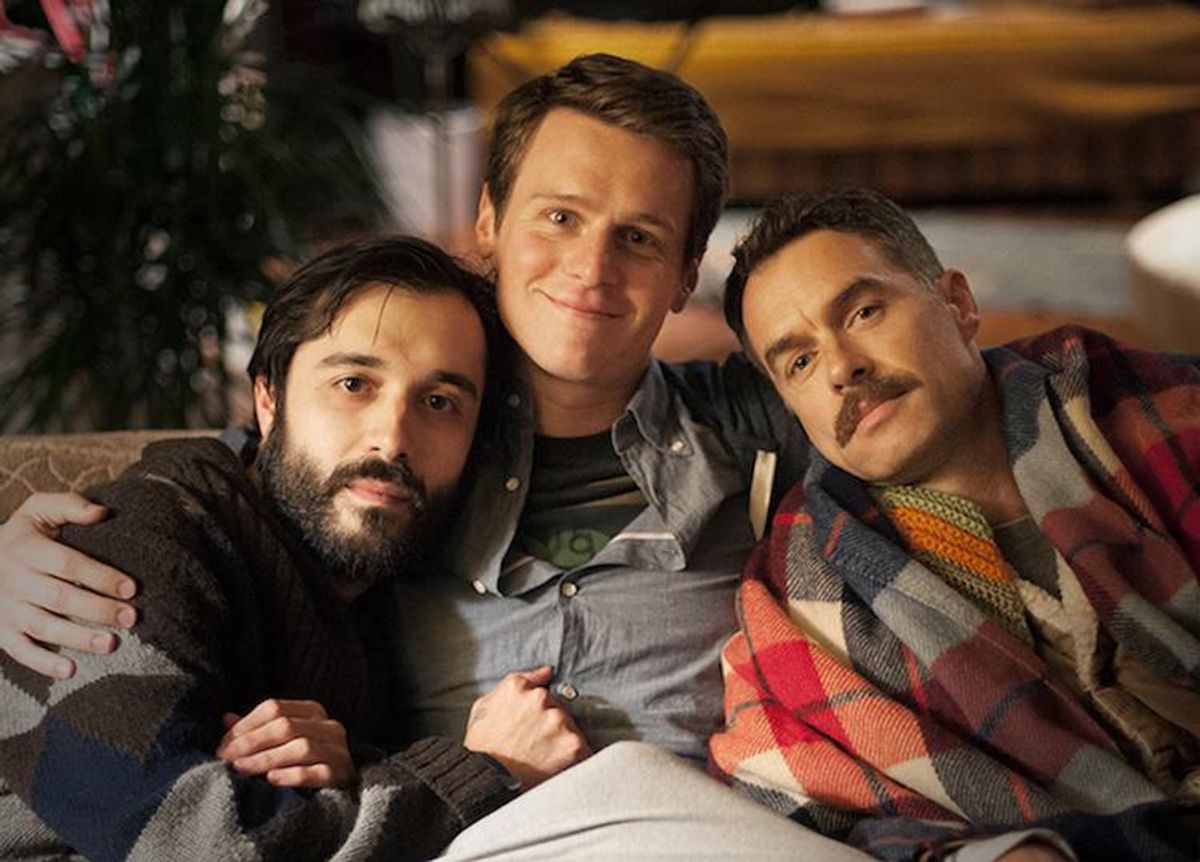



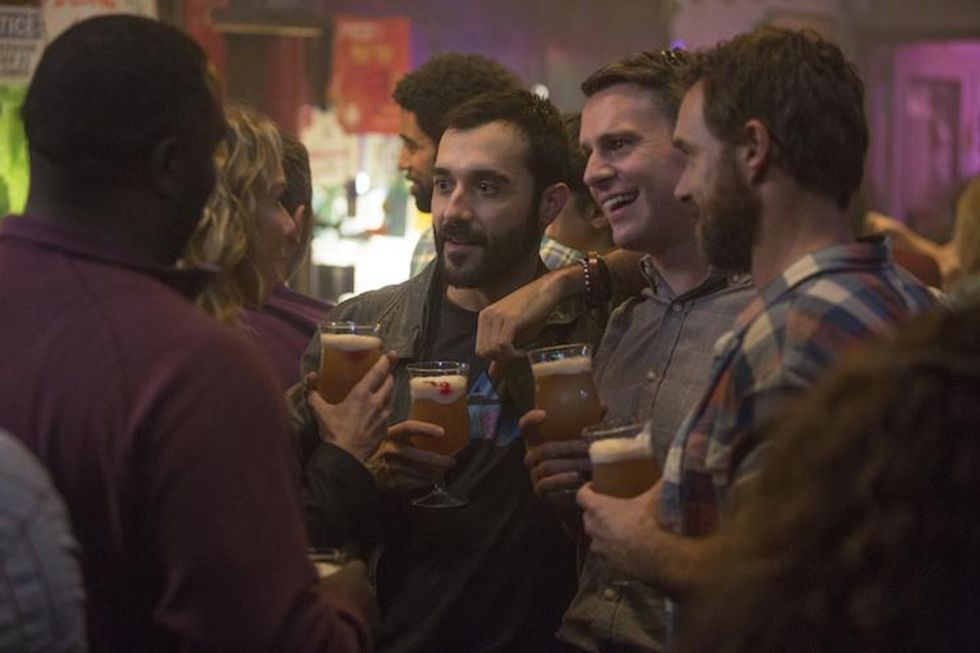
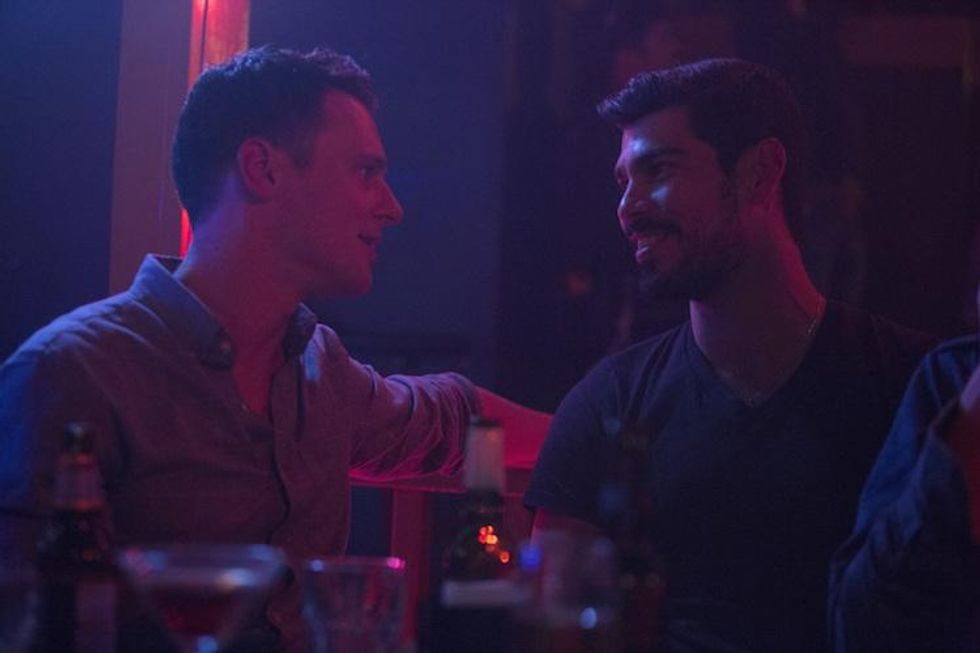
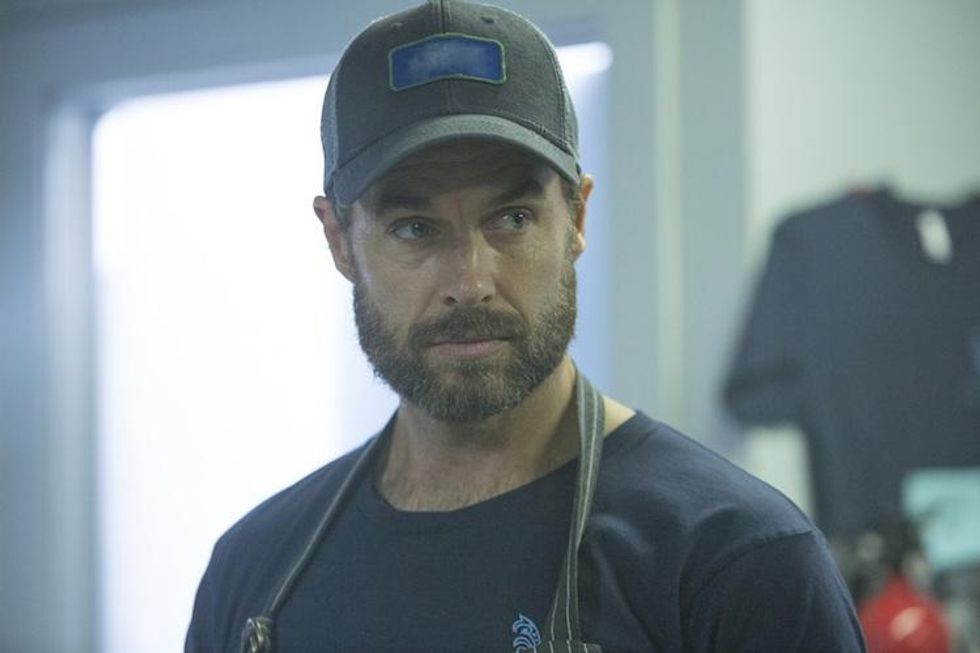
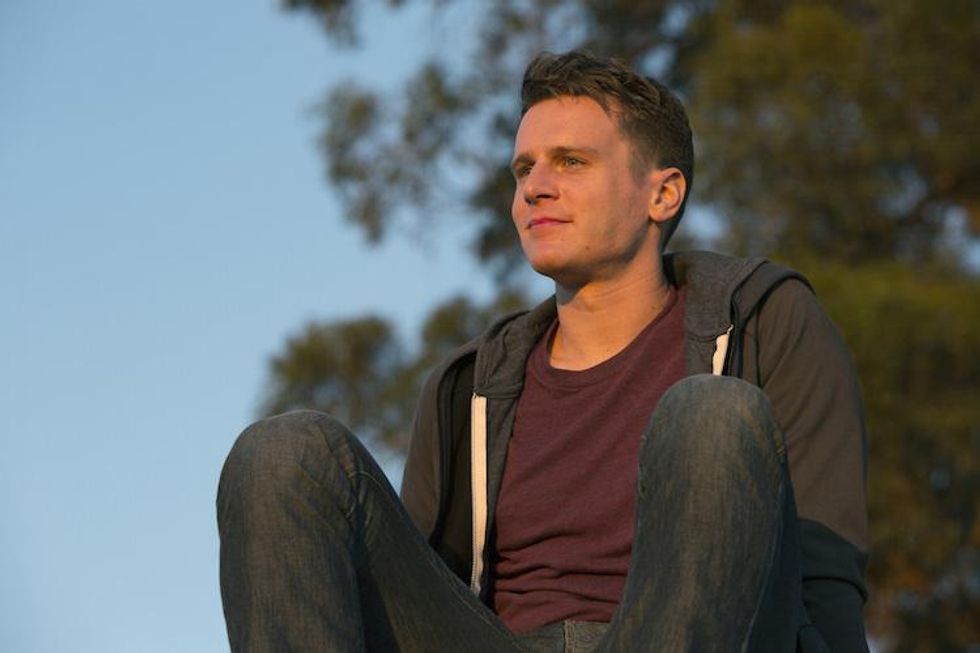
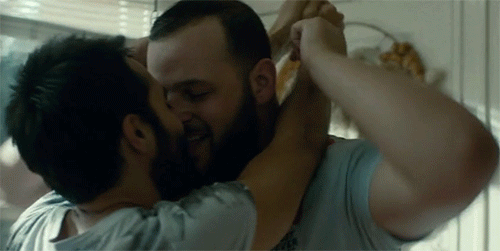
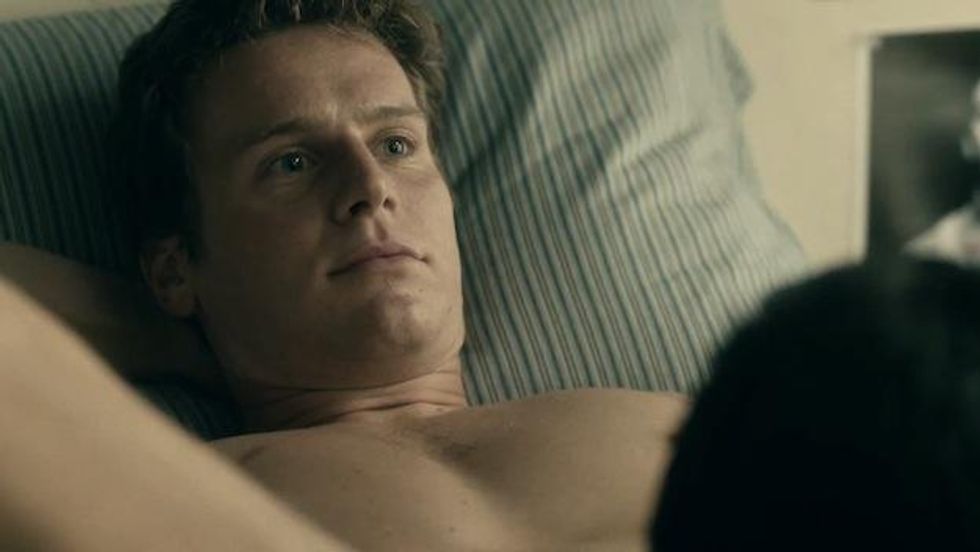
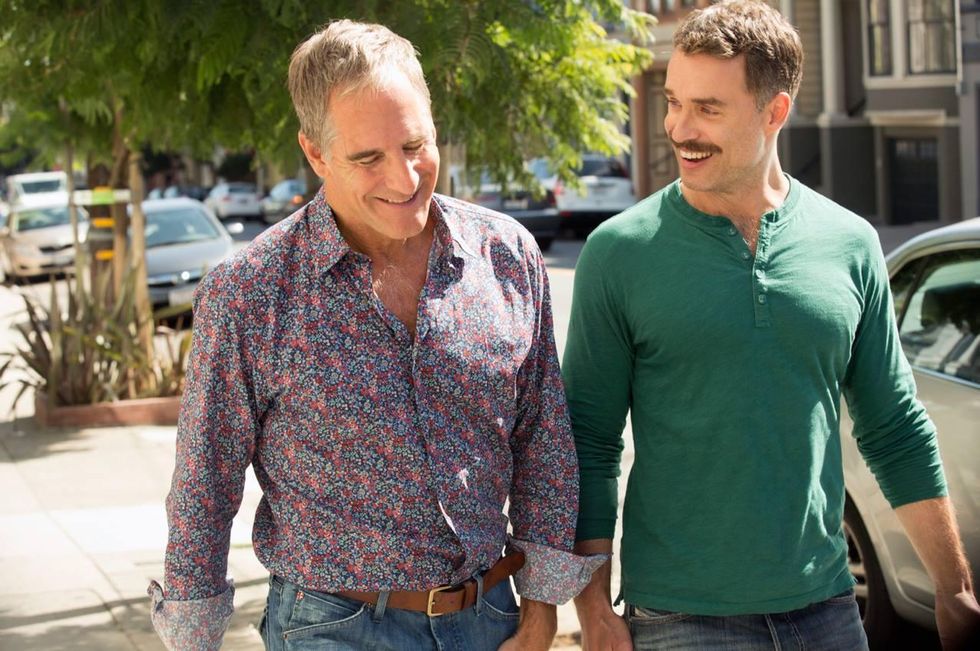
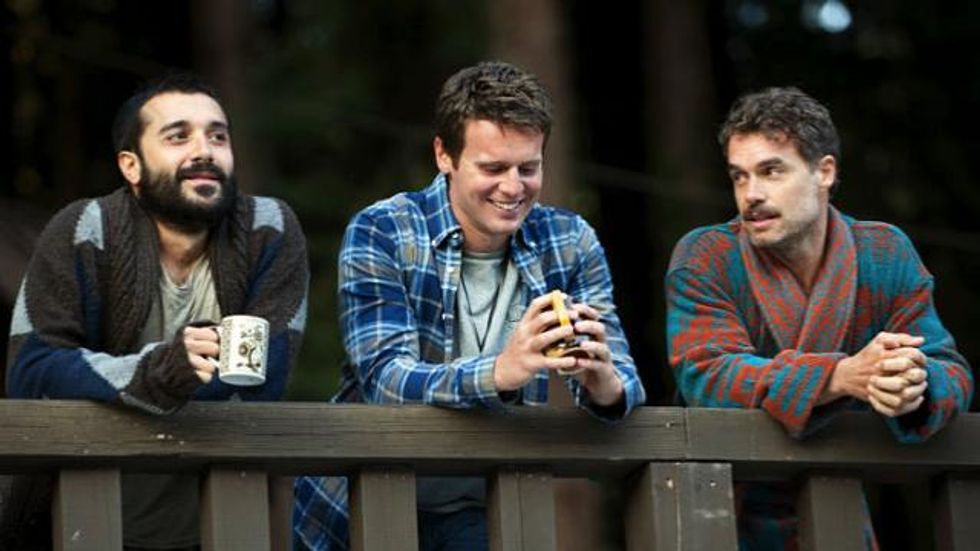
























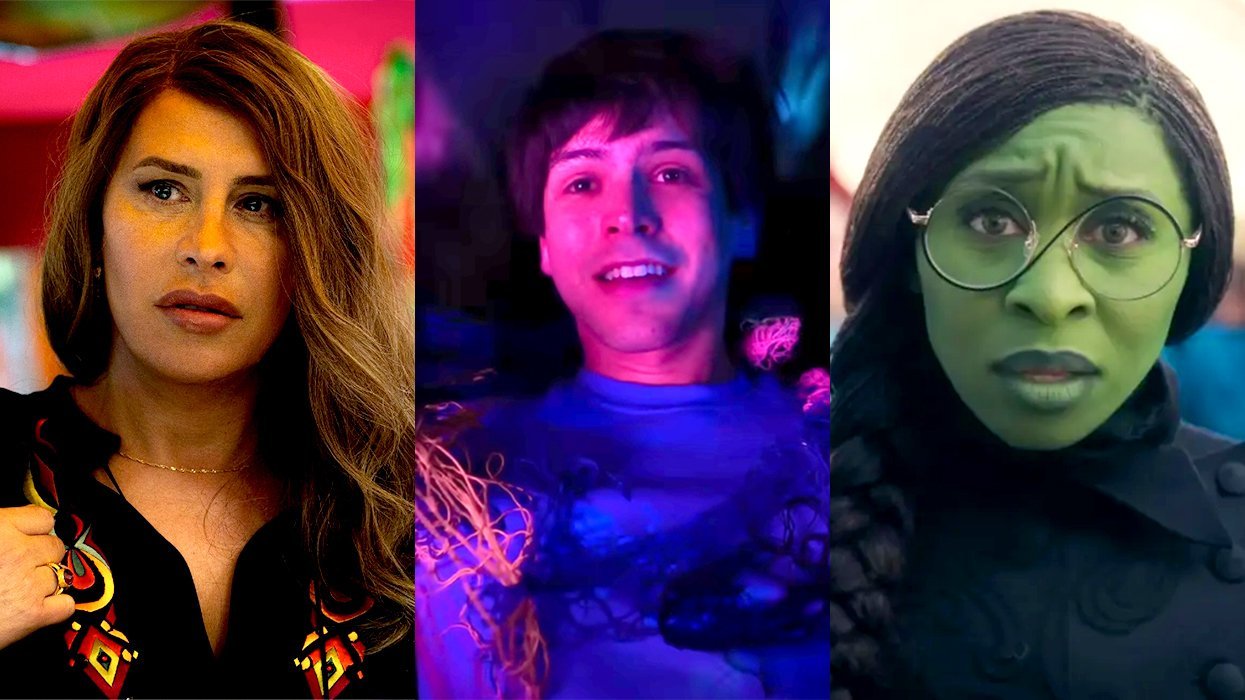




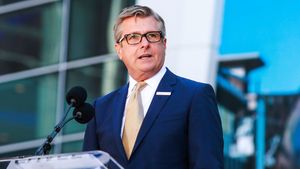
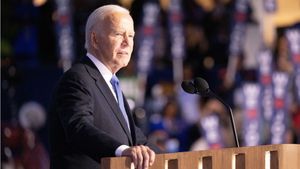

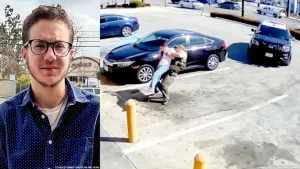















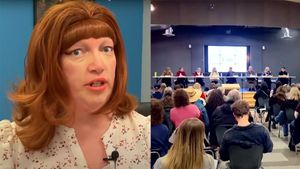
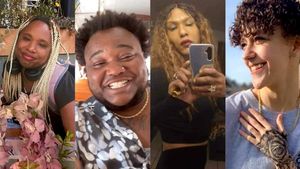



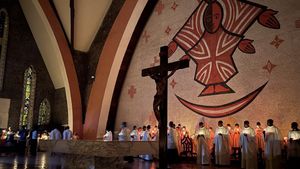













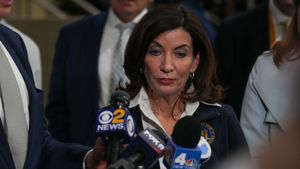
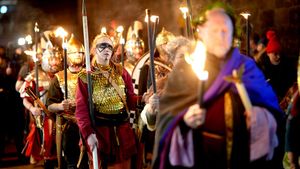
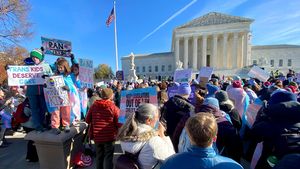







Sexy MAGA: Viral post saying Republicans 'have two daddies now' gets a rise from the right